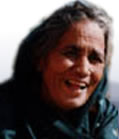 |
 |
||
 |
|||
|
RELATED THEMES employment and income food security social change OTHER LOCAL THEMES BACKGROUND |
economics
Some narrators feel that people's living standards have gone up as a result of a generally improved economic situation. However, several describe their difficulty coping with inflation and the sharp rise in the price of goods. A few mention school fees and books as being beyond their means. Many recall the past system which was based on exchange or barter rather than cash, though gradually money was introduced as well: ". Goods were exchanged or bartered, and bought for money also. Both ways were practised. This was the old custom." (India 4) Although it's clear that villagers still sometimes exchange goods and/or labour, a number of narrators regret the dominance of the cash economy. For some this is because they believe that a cash-based system has a negative social impact. India 8 explains: "The present economy has an utterly bad effect on us. The ancient system of goods exchange was excellent. If one was in need of ghee (clarified butter) one could have it by giving rice in exchange to the person who needed it. As I am a physician, I could have done free service or.got something in exchange for my medical services. The currency-based economy is giving rise to corruption [and] selfishness." Some groups' whole way of life revolved around barter. Gujjars and Bhotiyas, both traditionally nomadic, traded with Tibetans: "We used to barter different commodities with Tibetan people. They gave us wool and salt and we - being Bhotiya people - gave them barley, uva (variety of barley) and chemi. We bought wool from the Tibetans in large quantities. We used to spin wool and make carpets, blankets etc." (India 22) The conflict with China ended this trade, and some pastoralists have since taken up agriculture and waged work. For most, it is the loss of self-sufficiency that they regret about the shift to a cash economy. In the past a household's seeds, tools and labour were all obtained locally and "paid for" in kind. But the new hybrid seeds must be bought, along with the pesticides and fertiliser. Now, they say, at the start of the planting season the first thing a farmer must do is take stock of his cash, not his seeds. India 18 explains: "In the earlier days we used to have an exchange or barter system for dal (lentils), rice or other things for household consumption. But now we are dependent only on money. Earlier, when I had no oxen to plough the fields, I worked with a person for two days and got the oxen for my job. But now this is not possible. I have to pay for the oxen. We took care of the farming jobs together once, but now we have to engage labour on a daily wage basis. Thus one spends more paying labour than what one gets out of the agricultural produce." Several describe the bhandar, a village grain store. It operated like a savings bank, into which people "paid" grain when they had a surplus and from which they borrowed at times of shortage. Mahesha (India 3) describes it in detail, saying "The main objective.was to have enough stored for emergencies and famine and increase the funds for the village.[it] was an excellent system. There would be so much grain that we never needed to buy any from the market. The bhandar met our needs adequately." The grain bank system no longer seems to operate. Overall, there is perhaps a greater sense of economic insecurity for many villagers, despite the rise in cash incomes as a result of waged employment. Nor have the benefits been equally distributed. India 1 (Sudesha) criticises men for not spending their money to make the lives of their wives easier: "I keep telling the men, that since they keep boasting that they have lots of money, can they not get their wives gas connections? They have all travelled so much and those men, who have been in the army, think no end of themselves and boast that they have a lot of money. But I keep telling them, that as long as your wives have to go so far to collect firewood, you are nothing!" quotes about economics"There is no rain any more, and nothing grows. This is the main reason for inflation.We are not getting any yield from agriculture. earlier families used to have a rice yield of one dhon (32kgs).and sanwa, mandua. Nobody bought these things, which kept a check on the increase in price. Today everyone has to buy these things, which is causing inflation." "Earlier a good quality buffalo cost only Rs 3000. Now it sells for Rs 10 000, and the milk yield per buffalo is only 4 to 5 kg. Earlier, without any special feed, the yield used to be 10 to 12 kg and we also got good lots of ghee." "We have to think of self-sufficiency by keeping supply and demand in mind. Like earlier on, people would grow ramdana (amaranth) potatoes; they would have cattle and sheep and thus have ghee (clarified butter), they would make baskets out of ringal (mountain cane) and then take all their produce to the plains. The [plains people] would buy this stuff and trade with rice, dal (lentils) etc - whatever was not available here. This way... self-sufficiency can be developed. This is the only way for growth and development." ".if we borrow or lend from our own people then no interest is to be paid. We do deposit money in the bank but accept no interest on it. Interest is considered to be haram (forbidden in Islam) because no hard work has been done to earn it. If we are forced to accept the interest then we distribute it among lepers or blind people. Our religion prohibits us from taking this money." |
|